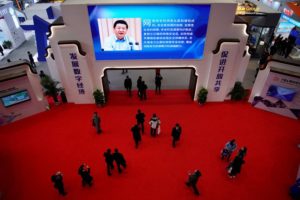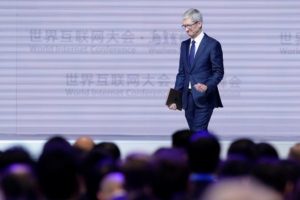Inside China’s Big Tech Conference, New Ways to Track Citizens

 An artificial intelligence company touted a robot that could help doctors with diagnoses. A start-up displayed a drone designed to carry a single passenger 60 miles per hour.
An artificial intelligence company touted a robot that could help doctors with diagnoses. A start-up displayed a drone designed to carry a single passenger 60 miles per hour.
And in a demonstration worthy of both wonder and worry, a Chinese facial recognition company showed how its technology could quickly identify and describe people.
If there were any doubts about China’s technological prowess, the presentations made this week at the country’s largest tech conference should put them to rest. The event, once a setting for local tech executives and leaders of impoverished states, this year attracted top American executives like Tim Cook of Apple and Sundar Pichai of Google, as well as executives of Chinese giants like Jack Ma of Alibaba and Pony Ma of Tencent.
The technology enabling a full techno-police state was on hand, giving a glimpse into how new advances in things like artificial intelligence and facial recognition can be used to track citizens — and how they have become widely accepted here.
A fast-growing facial recognition company, Face++, turned its technology on conferencegoers. On a large screen in its booth, the software identified their gender, described their hair length and color and characterized the clothes they wore.
The people overseeing China Unicom’s booth openly discussed the data, a sign of how widely accepted such surveillance and data collection have become in China.
China Telecom showed off its ability to measure the amount of trash in several garbage cans and detect malfunctioning fire hydrants.
Investors and analysts say China’s unabashed fervor for collecting such data, combined with its huge population, could eventually give its artificial intelligence companies an edge over American ones. If Silicon Valley is marked by a libertarian streak, China’s vision offers something of an antithesis, one where tech is meant to reinforce and be guided by the steady hand of the state.
The contradictions of using sites like Twitter to change opinions abroad, while blocking them domestically, were often evident but almost as often unremarked upon.
See the full story here: https://www.nytimes.com/2017/12/05/business/china-internet-conference-wuzhen.html?_r=0
Pages
- About Philip Lelyveld
- Mark and Addie Lelyveld Biographies
- Presentations and articles
- Tufts Alumni Bio